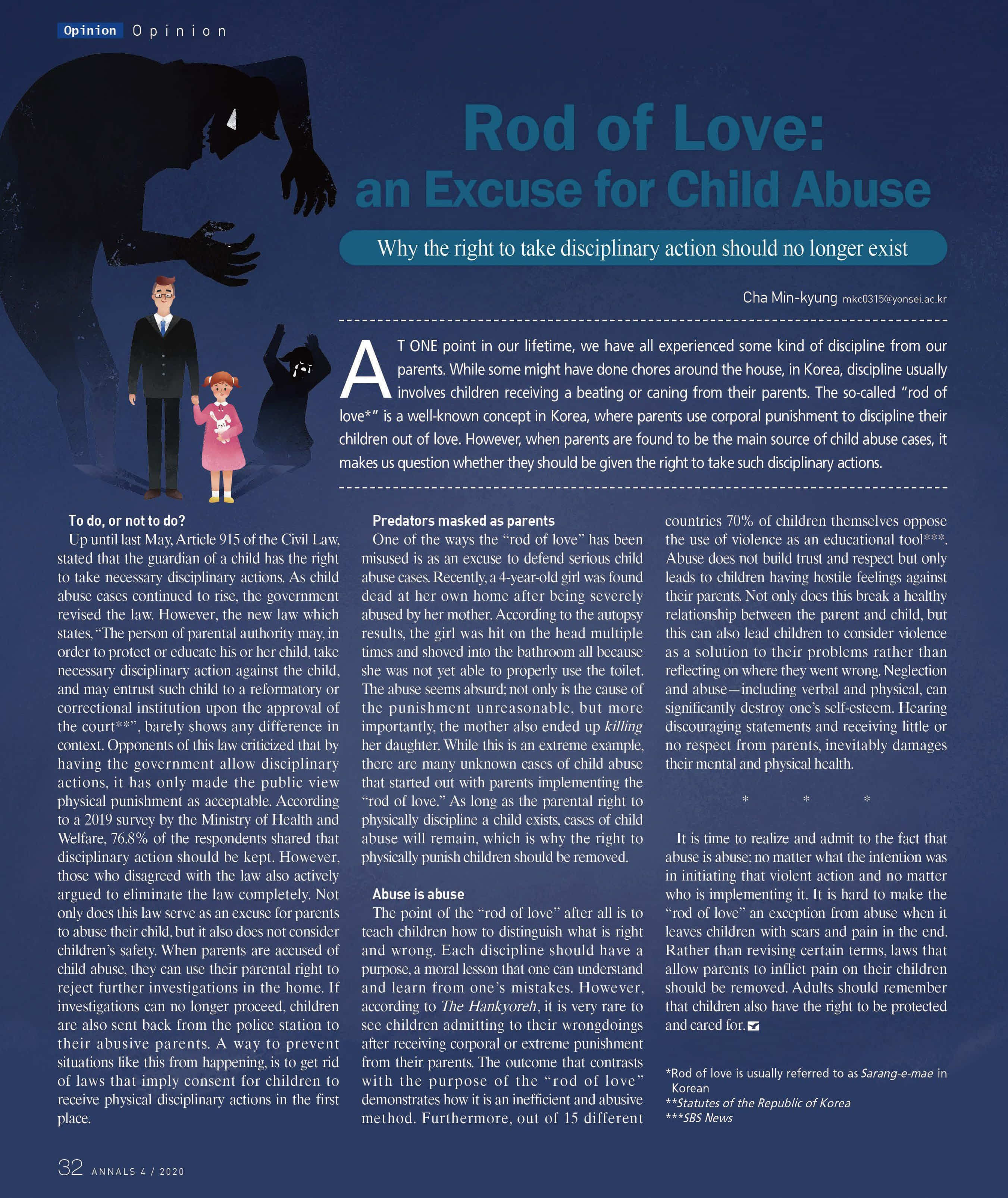Why the right to take disciplinary action should no longer exist

AT ONE point in our lifetime, we have all experienced some kind of discipline from our parents. While some might have done chores around the house, in Korea, discipline usually involves children receiving a beating or caning from their parents. The so-called “rod of love*” is a well-known concept in Korea, where parents use corporal punishment to discipline their children out of love. However, when parents are found to be the main source of child abuse cases, it makes us question whether they should be given the right to take such disciplinary actions.
To do, or not to do?
Up until last May, Article 915 of the Civil Law, stated that the guardian of a child has the right to take necessary disciplinary actions. As child abuse cases continued to rise, the government reviseㅇ the law. However, the new law which states, “The person of parental authority may, in order to protect or educate his or her child, take necessary disciplinary action against the child, and may entrust such child to a reformatory or correctional institution upon the approval of the court**”, barely shows any difference in context. Opponents of this law criticized that by having the government allow disciplinary actions, it has only made the public view physical punishment as acceptable. According to a 2019 survey by the Ministry of Health and Welfare, 76.8% of the respondents shared that disciplinary action should be kept. However, those who disagreed with the law also actively argued to eliminate the law completely. Not only does this law serve as an excuse for parents to abuse their child, but it also does not consider children’s safety. When parents are accused of child abuse, they can use their parental right to reject further investigations in the home. If investigations can no longer proceed, children are also sent back from the police station to their abusive parents. A way to prevent situations like this from happening, is to get rid of laws that imply consent for children to receive physical disciplinary actions in the first place.
Predators masked as parents
One of the ways the “rod of love” has been misused is as an excuse to defend serious child abuse cases. Recently, a 4-year-old girl was found dead at her own home after being severely abused by her mother. According to the autopsy results, the girl was hit on the head multiple times and shoved into the bathroom all because she was not yet able to properly use the toilet. The abuse seems absurd; not only is the cause of the punishment unreasonable, but more importantly, the mother also ended up killing her daughter. While this is an extreme example, there are many unknown cases of child abuse that started out with parents implementing the “rod of love.” As long as the parental right to physically discipline a child exists, cases of child abuse will remain, which is why the right to physically punish children should be removed.
Abuse is abuse
The point of the “rod of love” after all is to teach children how to distinguish what is right and wrong. Each discipline should have a purpose, a moral lesson that one can understand and learn from one’s mistakes. However, according to The Hankyoreh, it is very rare to see children admitting to their wrongdoings after receiving corporal or extreme punishment from their parents. The outcome that contrasts with the purpose of the “rod of love” demonstrates how it is an inefficient and abusive method. Furthermore, out of 15 different countries 70% of children themselves oppose the use of violence as an educational tool***. Abuse does not build trust and respect but only leads to children having hostile feelings against their parents. Not only does this break a healthy relationship between the parent and child, but this can also lead children to consider violence as a solution to their problems rather than reflecting on where they went wrong. Neglection and abuse—including verbal and physical, can significantly destroy one’s self-esteem. Hearing discouraging statements and receiving little or no respect from parents, inevitably damages their mental and physical health.
* * *
It is time to realize and admit to the fact that abuse is abuse; no matter what the intention was in initiating that violent action and no matter who is implementing it. It is hard to make the “rod of love” an exception from abuse when it leaves children with scars and pain in the end. Rather than revising certain terms, laws that allow parents to inflict pain on their children should be removed. Adults should remember that children also have the right to be protected and cared for.
*Rod of love is usually referred to as Sarang-e-mae in Korean
**Statutes of the Republic of Korea
***SBS News
Cha Min-kyung
mkc0315@yonsei.ac.kr

